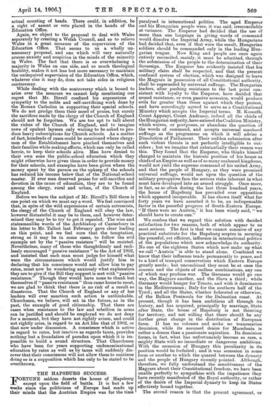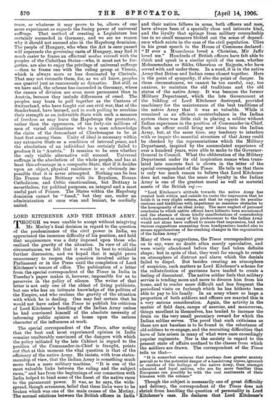THE HAPSBURG SUCCESS.
WORTUNE seldom deserts the house of Hapsburg 12 except upon the field of battle. It is but a few weeks since the politicians of Europe had made up their minds that the Austrian Empire was for the time paralysed in international politics. The aged Emperor and his Hungarian people were, it was said, irreconcilably at variance. The Emperor had decided that the use of more than one language in giving words of command would dissolve the Imperial Army, while the Hungarians had decided that, even if that were the result, Hungarian soldiers should be commanded only in the leading Hun- garian tongue. Now King and people are once again entirely reconciled, mainly, it must be admitted, through the submission of the people to the determination of their Sovereign. The Emperor has evidently insisted that his military claim shall be respected, and that the present confused system of election, which was designed to leave the Magyars in possession of all Constitutional authority, shall be superseded by universal suffrage. The Hungarian leaders, after pushing resistance to the last point con- sistent with loyalty to the Emperor, have decided that armed resistance, or even passive secession, would produce evils far greater than those against which they protest, and have accordingly agreed to serve as a Constitutional Ministry which accepts the Imperial terms. M. Kossuth, Count Apponyi, Count Andrassy, indeed all the chiefs of the Hungarian majority, have entered the Coalition Ministry, which waives, or postpones, or abandons the question of the words of command, and accepts universal manhood suffrage as the programme on which it will advise a Dissolution of Parliament. Their sudden submission after such violent threats is not perfectly intelligible to out- siders; but we imagine that substantially their reason was this. They found that the Emperor, who thinks himself charged to maintain the historic position of his house as chiefs of an Empire as well as of so many coalesced kingdoms, would not yield the supreme command of his united Army, and that the people of Hungary, as they were promised universal suffrage, would not upon the question of the military prerogative face the serious risks inherent in what must have developed into an armed struggle. Once more, in fact, as so often during the last three hundred years, the house of Hapsburg has prevailed over opposition which appeared insuperable. It has shown itself what for forty years we have asserted it to be, an indispensable factor in the peaceful progress of South-Eastern Europe. "If there were no Austria," it has been wisely said, "we should have to create one."
We confess that we regard this solution with decided satisfaction for two reasons, both of which appear to us most serious. The first is that we cannot conceive of any practical substitute for the Hapsburg sceptre in securing the peaceful, yet efficient, influence in international politics of the populations which now acknowledge its authority. No one of the eighteen States which now make up what we call " Austria " is able to stand alone. Combined we know that their influence tends permanently to peace, and to a kind, of tranquil conservatism which Eastern Europe greatly needs ; but uncombined they must be at once the sources and the objects of endless combinations, any one of which may produce war. The Germans would go one way, the Magyars another, and the Slays a third ; while Germany would hunger for Trieste, and with it dominance in the Mediterranean ; Italy for the southern half of the Tyrol; and all the States, whether federated or otherwise, of the Balkan Peninsula for the Dalmatian coast. At present, though it has been ambitious all through its history, and has acquired, principally by marriage, State after State, the house of Hapsburg is not thirsting for territory, and not willing that there should be any further great change in the distribution of European force. It has no colonies and seeks no transmarine dominion, while its assumed desire for Macedonia is rather a dream than a passionate aspiration. Its dominion forms, in fact, what has unfortunately become so rare, a mighty State with no immediate or dangerous ambitions. With the secession of Hungary this peculiarity in its position would be forfeited ; and it was secession in some form or another to which the quarrel between the dynasty and the people of Hungary recently pointed. Although, therefore, we fully understand the sensitiveness of the Magyars about their Constitutional freedom, we have been unable perfectly to sympathise with the impatience they have recently manifested of the Royal authority, or rather of the desire of the Imperial dynasty to keep its States effectively bound together.
The second reason is that the present agreement, or truce, or whatever it may prove to be, allows of one more experiment as regards the fusing power of universal suffrage. That method of creating a Legislature has certainly succeeded in Germany, and we see no reason why it should not succeed also in the Hapsburg dominion.. The people of Hungary, who when the Act is once passed will supersede the governing caste of Hungary, may find it much easier to frame an effectual modus vivendi with the peoples of the Cisleithan States—who, it must not be for- gotten, are also to enjoy the privilege of universal suffrage —than to frame one with the ruling group at Vienna, which is always more or less dominated by Clericals. That may not reconcile them, for, as we all know, peoples can quarrel just as rancorously as dynasties. But still, as we have said, the scheme has succeeded in Germany, where the causes of division are even more permanent than in Austria, because they include differences of creed. The peoples may learn to pull together as the Cantons of Switzerland, who have fought out one civil war, that of the Sonderbund, have learned, and in such pulling to combine their strength as an indivisible State with such a measure of freedom as may leave the Hapsburgs the protectors, rather than the oppressors, of the forty-six millions of men of varied civilisations who to a man acknowledge the claim of the descendant of Charlemagne to be at least first among them. Unity of ideal is necessary within any extensive State as a condition of internal peace, and the absolutism of an individual has certainly failed to produce it in "Austria." It remains to be seen whether the only visible alternative will succeed. Universal suffrage is the absolutism of the whole people, and has at least this advantage in a composite State, that if it decides upon an object, physical resistance is so obviously im- possible that it is never attempted. Nothing can be less like France than Brittany with its Royalism, Roman Catholicism, and Celtic emotionalism, but Brittany is nevertheless, for political purposes, an integral and a most useful part of France. The States within the Hapsburg dominion cannot be "fused," but they can, under an administration at once wise and lenient, be cordially united.







































 Previous page
Previous page